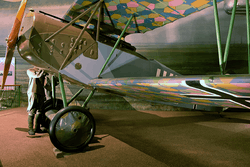List of surviving Fokker D.VIIs
Acquisitions of German Fokker D.VII wartime aircraft by Allied countries after the 1918 Armistice has ensured that several examples have been preserved.
America

.jpg)
One war prize was captured in 1918 when it accidentally landed at a small American airstrip near Verdun, France. It was donated to the Smithsonian Institution by the War Department in 1920, and is now displayed at the National Air and Space Museum in Washington, D.C.[2]
Two other American war prizes were retained by private owners until sold abroad in 1971 and 1981. The former is now displayed at the Canada Aviation Museum, in Ottawa, Ontario.[3] The latter aircraft has been painted in Royal Netherlands Air Force markings, and is on display in Militaire Luchtvaart Museum in Soesterberg, Netherlands.
Canada

Of the 22 D.VII aircraft acquired by Canada, one is displayed at the Brome County Historical Society, in the Knowlton neighborhood of Lac-Brome, Quebec. This unrestored Albatros-built example, serial number D.6810/18, is the only surviving D.VII that retains its original, Vierfarbiger four-color lozenge camouflage fabric covering, and is the original source of documentation for the four-color variant of the pre-printed covering.[4]
France
One example of the aircraft sent to France is at the Musée de l'Air et de l'Espace in Paris, France.
Germany
.jpg)
A former Marine Luchtvaartdienst D.VII MLD 20 [5]was discovered in a German barn in 1948. This aircraft is now displayed at the Deutsches Museum in Munich, Germany.[6]
United Kingdom
.jpg)
The example preserved in the Royal Air Force Museum in London has an uncertain early history. It was abandoned in Belgium by retreating German forces in 1918 and is likely to be one of the aircraft that served post-war in the Belgian Air Force. It was one of three that were sold and registered to Belgian civilian owners. In 1938, it was shipped to the United Kingdom and added to the aircraft collection of Richard Nash. Under the subsequent ownership of the Royal Aeronautical Society, it was displayed at various collections and exhibitions after World War 2 before being acquired by the RAF Museum in 1992.[7]
References
- The Fokker D.VII File
- "Fokker Legend, Memory and the Great War in the Air: Fokker D.VII." National Air and Space Museum. Retrieved: 7 June 2008.
- Fokker 10347/18 Canada Aviation Museum website
- Batter, Wally (February 1982). "Color Full Notes". World War I Aeroplanes (88): pg.50.
- The Aerodrome forum
- "Fokker D VII." Deutsches Museum. Retrieved: 24 April 2011.
- Simpson, Andrew (2014). "INDIVIDUAL HISTORY FOKKER DVII OAW 8417/18 /9207M MUSEUM ACCESSION NUMBER 75/AF/804" (PDF). Royal Air Force Museum. Retrieved 5 September 2015.